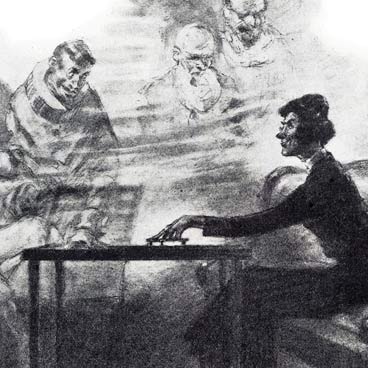Originally published in the Post on May 22, 1920.
A strong factor in the popularity of the Ouija board as a domestic utensil is the prevalence of Ouija board agencies throughout the country. No shopping round is necessary; you can buy one anywhere, from a notion counter to a used-car emporium. Its purchase used to involve much secret diplomacy. You had to worm the manufacturer’s address from some obscure acquaintance who was rumored to go in for all that sort of thing, and then you had to send to some vague place in the West, whence your Ouija board came to you, f. o. b., in a plain wrapper. Now there is not the slightest hitch—you can pick one up anywhere on the way home. Our own corner drug store has been celebrating Ouija Week for the past month or so, and I understand that the boards are going like hot cakes—after all, you can’t better the old similes. They certainly make a tasteful window display, combined, as they are, with garlands of rubber bath hose, with notes of color introduced by a few hot-water bags here and there. I imagine that the exhibit was arranged by the same person who thinks up names for the drinks served at the soda fountain.
What a simple matter this thing of communicating with the spirits has turned out to be, since the Ouija board made its entrance into the great American family life. There is practically nothing to it-anybody can do it in the privacy of his own room. Look at the results that the members of our little circle have been getting, for instance, since we took up the Ouija board in a really thorough way. And we never had a lesson in our lives, any of us. It has been a rough season, locally, for the professional medium trade; I doubt, if the professionals have even made expenses, since we learned that we could do it ourselves.
| As the Spirit Moves by Dorothy Parker Originally published in the Post on May 22, 1920. |
| Part I: The New, Prohibition-Era Pastime |
| Part II: The Age of the Ouija Boards |
| Part III: When the Bridge Hounds Were Unleashed |
| Part IV: Henry G. Takes to Verse |
| Part V: Aunt Bertha’s Snappy Work |
| Part VI: Mrs. Couch & Mrs. Thill |
| Part VII: Too Much Is Enough |
Home spirit communication has completely revolutionized our local social life. I often wonder what we should ever do with our evenings if it weren’t for the spirits. Since they have taken to dropping in for an informal chat over the Ouija board we never lack a lively parlor game for one and all-metaphysical, yet clean.
And then just look at the money we save on amusement taxes! You know how it is yourself; the minute you leave home to make an evening of it, it runs right into expense. What with the cost of theater tickets, cabaret food and taxicab charter—good night, as the saying goes. Even such wholesome community activities as inter-apartment poker games, wives welcome, come under the head of outgo sooner or later. Of course this is a relatively free country, and no one has a better right than you to your own opinion of the Ouija board as a medium of communication with the next world; but considering it solely as a means of after-dinner entertainment you must concede that the price is right, anyway.
Where would our little circle be of an evening if the spirits had not grown so clubby? Sitting round, that’s where we would be, trying to figure out if the William Hart picture round at the Elite Motion-Picture Palace was the same one that they showed the week before over at the Bijou Temple of Film Art. Since we got our Ouija board I have so completely lost touch with the movies that Theda Bara may have got religion, for all I know about it.
Become a Saturday Evening Post member and enjoy unlimited access. Subscribe now




Comments
William Hart and Theda Bara! How many of us would now know what stereotypes Ms. Parker was referencing in her remarks concerning these entertainment pioneers? Of course, it is only fair to note that Dorothy Parker was, herself, an entertainment pioneer.
Truly enjoyed this post.